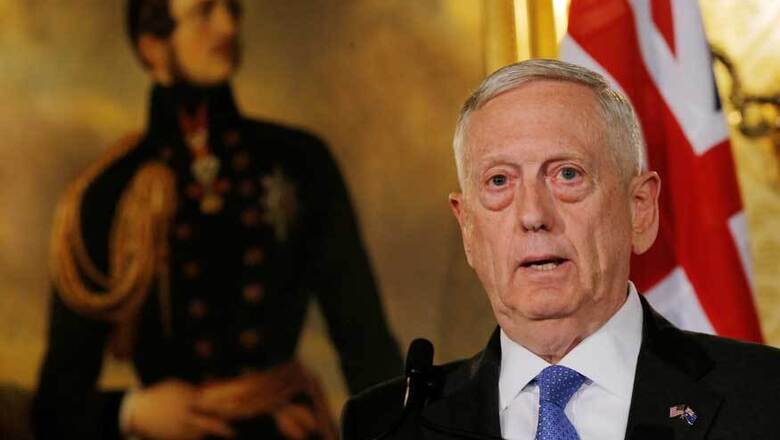
views
Washington: The Trump administration is still sorting out "the big ideas" for a new Afghanistan strategy, beyond troop levels and other military details, Defense Secretary Jim Mattis said Friday.
"We're close," he said in an impromptu exchange with reporters at the Pentagon one day after President Donald Trump met with him and his military chiefs for a broad discussion that aides said touched on Afghanistan and other issues.
The US has been fighting in Afghanistan for nearly 16 years, and as recently as June Mattis said "we are not winning."
Mattis told Sen. John McCain at a hearing last month that he would have the Afghanistan strategy ready by mid-July. On Friday he was asked what is holding it up.
"It just takes time," he said. "It wasn't that past presidents were dumb or anything else. This is hard work, so you've got to get it right. That's all there is to it."
He also said it is vitally important to "get the big ideas right," meaning to establish a consensus within the government on what problem Afghanistan poses and what policy goal is being pursued by committing US troops there. He called this "orders of magnitude" more difficult that deciding military tactics.
"It's easy only for the people who criticize it from the outside and who don't carry the responsibility for integrating it altogether," he said, referring to making diplomatic and economic elements a part of the overall strategy.
Although Mattis did not mention him Friday, McCain is among the more vocal critics of the administration's lack of an Afghan strategy.
On Thursday, McCain mentioned his frustration on Afghanistan in a statement on the separate matter of the administration reportedly deciding to end a program to assist the Syrian opposition to President Bashar Assad.
"Six months into this administration, there is still no new strategy for victory in Afghanistan, either," McCain said. "It is now mid-July, when the administration promised to deliver that strategy to Congress, and we are still waiting."
In his remarks at the Pentagon, Mattis revealed no details of the ongoing administration debate.
He cast the Afghanistan problem in the context of past American wars, including those that did not end well — such as Vietnam — and those that still have not ended, such as Iraq. He said he wants to be sure there is administration agreement on the political goals as well as the military means.
"I realize this probably looks easy, but it is not easy," he said.
Mattis said a decision disclosed by the Pentagon on Friday to withhold $50 million in "coalition support funds" for Pakistan — money it receives each year as reimbursement for logistical support for US combat operations — was separate from deliberations over a new Afghanistan strategy. Officials have said the US approach to Pakistan is an important part of the Afghan strategy debate, in part because a Taliban faction known as the Haqqani network enjoys sanctuary in Pakistan. US officials called the Haqqani network the most lethal element of the Taliban opposition in Afghanistan.
The Pentagon said in a statement Friday that Mattis has informed congressional committees that he could not certify that Pakistan has taken sufficient action against the Haqqani network to deserve full reimbursement this year. Of $900 million in proposed reimbursement, Pakistan earlier received $550 million and Congress a few months ago withheld $300 million.
Mattis' certification decision means the remaining $50 million also will be withheld.
The Pentagon chief said this was not a reflection of a new, tougher US policy toward Pakistan.
"This is simply an assessment of the current state of play" with regard to suppressing the Haqqani threat. "It's not a policy. It is the reality."
Pakistan is authorized to receive up to another $900 million in support funds this coming year, of which $400 million is subject to Pentagon certification of sufficient Pakistani effort against the Haqqani network.
"In our discussions with Pakistani officials, we continue to stress that it is in the interest of Pakistan to eliminate all safe havens and reduce the operational capacity of all militant organizations that pose a threat to US and Pakistani interests as well as regional stability," a Pentagon spokesman, Adam Stump, said.
Last year, then-Defense Secretary Ash Carter determined the Pakistani effort against the Haqqani network was insufficient, and as a result $300 million in support funds was withheld.



















Comments
0 comment